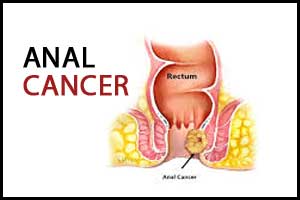- Home
- Editorial
- News
- Practice Guidelines
- Anesthesiology Guidelines
- Cancer Guidelines
- Cardiac Sciences Guidelines
- Critical Care Guidelines
- Dentistry Guidelines
- Dermatology Guidelines
- Diabetes and Endo Guidelines
- Diagnostics Guidelines
- ENT Guidelines
- Featured Practice Guidelines
- Gastroenterology Guidelines
- Geriatrics Guidelines
- Medicine Guidelines
- Nephrology Guidelines
- Neurosciences Guidelines
- Obs and Gynae Guidelines
- Ophthalmology Guidelines
- Orthopaedics Guidelines
- Paediatrics Guidelines
- Psychiatry Guidelines
- Pulmonology Guidelines
- Radiology Guidelines
- Surgery Guidelines
- Urology Guidelines
New treatment approach for advanced anal cancer

"InterAACT: A multicentre open-label randomised phase II advanced anal cancer trial of cisplatin (CDDP) plus 5-fluorouracil (5-FU) vs carboplatin (C) plus weekly paclitaxel (P) in patients (pts) with inoperable locally recurrent (ILR) or metastatic treatment naïve disease - An International Rare Cancers Initiative (IRCI) trial."
A new approach to treating advanced anal cancer is safer and more effective than the most widely used current treatment, according to the first-ever randomized clinical trial in this group of patients.
Around 1,300 people are diagnosed with anal cancer each year in the UK and this number is rising by around three percent per year. Due to small patient populations, there is very limited evidence to guide treatment decisions, and international consensus among clinicians is lacking. The findings from this study will set a new standard of care for this rare type of cancer.
The international randomized phase II trial, led by The Royal Marsden NHS Foundation Trust and presented today (Monday 22 October) at the European Society for Medical Oncology (ESMO) Congress 2018, analyzed data from 91 patients in four countries, including the UK, Norway, the US, and Australia.
The researchers found that a chemotherapy combination of Carboplatin and Paclitaxel - which is primarily used to treat other cancers, including ovarian, womb and lung cancer - performed better overall compared to chemotherapy treatment with Cisplatin and 5-fluorouracil.
In the trial, endorsed by the International Rare Cancer Initiative (IRCI), Carboplatin and Paclitaxel performed better both in terms of survival rates and safety. Until now, when anal cancer had spread or come back after treatment, doctors had considered Cisplatin and 5-fluorouracil to be the preferred first-line treatment option.
Study Chief-Investigator Dr Sheela Rao, Consultant Medical Oncologist at The Royal Marsden, said: "The results of this study will immediately change patient care. While treatment with Cisplatin and 5-fluorouracil was generally considered a reasonable option for advanced anal cancer, we now know that carboplatin and paclitaxel are more effective and better tolerated. In our study, these patients lived seven months longer overall.
"Around 30 percent of people with anal cancer will develop the advanced disease which cannot be treated surgically, and all of these patients are eligible to receive this chemotherapy combination."
Professor David Sebag-Montefiore, a study co-author and Cancer Research UK anal cancer expert, said: "Making progress in rare cancers is incredibly difficult, so it's very exciting to see these results which, in my opinion, are practice changing. This important research informs both patients and their cancer teams that the combination of the chemotherapy drugs carboplatin and paclitaxel should be the first-line treatment for advanced anal cancer.
"This study also shows the benefit of international collaboration within the International Rare Cancer Initiative (IRCI) - it can deliver results in rare diseases that individual countries cannot achieve on their own."
Professor David Cunningham, Director of the NIHR Biomedical Research Centre at The Royal Marsden and The Institute of Cancer Research, London, said: "These findings set a new standard of care and highlight the importance of international collaboration for advances in the treatment of rare cancers. We now have the backbone for future trials into novel treatments for advanced anal cancer, including immunotherapy."

Disclaimer: This site is primarily intended for healthcare professionals. Any content/information on this website does not replace the advice of medical and/or health professionals and should not be construed as medical/diagnostic advice/endorsement or prescription. Use of this site is subject to our terms of use, privacy policy, advertisement policy. © 2020 Minerva Medical Treatment Pvt Ltd